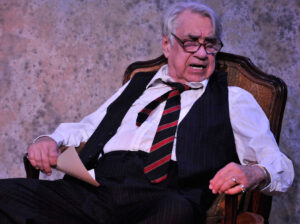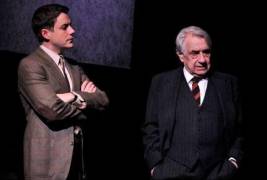
As long as there are parents and children and their accompanying relationship ups-and-downs, Robert Anderson’s I Never Sang For My Father will remain every bit as relevant to our times as the latest World Premiere drama. For proof positive, do not fail to catch The New American Theatre’s superb revival at the McCadden Place Theatre.
 When I Never Sang For My Father debuted on Broadway in 1968, words like dysfunctional and codependent hadn’t yet become part of our collective vocabulary, nor were there talk shows where dysfunctional participants in codependent relationships could let it all hang out, nor had cell phones, the Internet, or any of the things now vital to our everyday lives even been invented.
When I Never Sang For My Father debuted on Broadway in 1968, words like dysfunctional and codependent hadn’t yet become part of our collective vocabulary, nor were there talk shows where dysfunctional participants in codependent relationships could let it all hang out, nor had cell phones, the Internet, or any of the things now vital to our everyday lives even been invented.
What there were, then as now, were irascible aging parents making their adult children’s lives miserable, even as those grown-up children continued to strive in vain for their parents’ acceptance and love.
It’s precisely this situation that college professor Gene Garrison (John Sloan) finds himself in at age thirty-six in I Never Sang For My Father. His septuagenarian mother Margaret (Anne Gee Byrd) has survived two operations for cancer, three heart attacks, painful arthritis, and fifty-odd years of marriage to bombastic, belligerent Tom (Philip Baker Hall), a successful businessman who pulled himself up by his own bootstraps—and will never (even at the age of eighty) let you forget it.
Like Tom Wingfield in Tennessee Williams’ The Glass Menagerie, a 40ish Gene narrates this memory play from some future point at which he has been able to distance himself physically—though not emotionally—from his familial baggage. Gene’s recollections begin at Pennsylvania Station with his parents’ return to New York from their annual winter stay in sunny Florida, Tom’s loud complaints about lost luggage and his insistence that his bags are brown and not, as Gene well knows, gray attesting to early signs of dementia.
With a father like Tom Garrison, even a dinner at Schrafts can be pure torture, with Dad insisting on showing off his “golden diamond” ring for the gazillionth time, ranting on about the restaurant’s exorbitant prices, and demanding to pay the tab over Gene’s protests. Things don’t appear any easier for Margaret, who has time and time again had to put up with her husband’s insistence on “going over and over the old times” whether at home or out with friends, “old times” being his miserable upbringing by a deadbeat, drunk of a father whom a ten-year-old Tom threw out of his mother’s funeral and never laid eyes on again. You get the picture.
 Widower Gene has recently spent some time off from work in California, and he’s met a divorcee with two children, a woman he’d like to start afresh with. Tom tells Gene in no uncertain terms that a move away from New York would kill his mother. Margaret gives Gene her blessing. Then, before any decision can be made, she dies, leaving her son torn between a need for freedom and independence and one last try at loving his father and being loved in return, despite the unlikelihood of either miracle ever happening.
Widower Gene has recently spent some time off from work in California, and he’s met a divorcee with two children, a woman he’d like to start afresh with. Tom tells Gene in no uncertain terms that a move away from New York would kill his mother. Margaret gives Gene her blessing. Then, before any decision can be made, she dies, leaving her son torn between a need for freedom and independence and one last try at loving his father and being loved in return, despite the unlikelihood of either miracle ever happening.
Director Cameron Watson has guided his almost all-Equity cast’s performances with an accomplished hand, used a small, tricky black box space with considerable imagination, and created a production that rings true and timeless, despite its now period setting.
 Hall joined the cast of I Never Sang as a last minute replacement, learning the gargantuan part, rehearsing the play, and opening the production—all in a scant three weeks. At least one reviewer has already called Baker’s the performance of the year, and a wow of a performance it is, the kind of breathtaking work that inspires words like “force of nature,” “larger than life,” “tour de force” … take your pick. Hall’s thunderous, blustering, glowering, bellowing, egocentric Tom fills the McCadden stage with the crushing power of his personality, eliciting from the audience both awe and pity, and keeping us wishing for Gene’s escape even as we understand his reasons for staying.
Hall joined the cast of I Never Sang as a last minute replacement, learning the gargantuan part, rehearsing the play, and opening the production—all in a scant three weeks. At least one reviewer has already called Baker’s the performance of the year, and a wow of a performance it is, the kind of breathtaking work that inspires words like “force of nature,” “larger than life,” “tour de force” … take your pick. Hall’s thunderous, blustering, glowering, bellowing, egocentric Tom fills the McCadden stage with the crushing power of his personality, eliciting from the audience both awe and pity, and keeping us wishing for Gene’s escape even as we understand his reasons for staying.
 Formidable as Hall’s task is in making Tom more than just a caricature of old age, Sloan’s low-key role proves an almost equal acting challenge. Gene must be soft-spoken but no wimp, must be strong yet still convince us that from childhood on, he’s been living in his father’s shadow and failing ever to gain the upper hand. Sloan meets these challenges, and then some, giving a performance of subtle power and grace, one that makes Gene’s final confrontation with his father all the more gut-wrenching and his end-of-play soliloquy all the more touching.
Formidable as Hall’s task is in making Tom more than just a caricature of old age, Sloan’s low-key role proves an almost equal acting challenge. Gene must be soft-spoken but no wimp, must be strong yet still convince us that from childhood on, he’s been living in his father’s shadow and failing ever to gain the upper hand. Sloan meets these challenges, and then some, giving a performance of subtle power and grace, one that makes Gene’s final confrontation with his father all the more gut-wrenching and his end-of-play soliloquy all the more touching.
Byrd, L.A. theater’s answer to Vanessa Redgrave, creates a Margaret any one of us would be grateful to call Mother, warm, generous, unselfish, optimistic, witty, and impossible to forget. Thanks to Byrd’s powerful work, Margaret’s presence remains vivid long after her passing.
 Margaret’s (and Byrd’s) exit means the arrival of prodigal daughter Alice (Dee Ann Newkirk), Gene’s older sister whom Tom had banished years before for marrying a Jew. Unlike her brother, Alice has managed quite nicely without the old man’s approval, it is she who insists that regardless of Gene’s decision vis-à-vis California, the two siblings must get Dad to agree either to hire a full-time housekeeper or to move into an old age home. (You can guess how Tom reacts to that!) Newkirk is absolutely terrific as Alice, never more so than when Sis tries to get it into her Gene’s skull that his father never has and never will regard him “as a man, an equal, a male.” Sparks fly, generated by Newkirk’s ballsy work.
Margaret’s (and Byrd’s) exit means the arrival of prodigal daughter Alice (Dee Ann Newkirk), Gene’s older sister whom Tom had banished years before for marrying a Jew. Unlike her brother, Alice has managed quite nicely without the old man’s approval, it is she who insists that regardless of Gene’s decision vis-à-vis California, the two siblings must get Dad to agree either to hire a full-time housekeeper or to move into an old age home. (You can guess how Tom reacts to that!) Newkirk is absolutely terrific as Alice, never more so than when Sis tries to get it into her Gene’s skull that his father never has and never will regard him “as a man, an equal, a male.” Sparks fly, generated by Newkirk’s ballsy work.
Other roles are considerably smaller, but performed with absolute credibility—John Combs as Marvin Scott, a friend of the Garrisons; Brittani Ebert as Margaret’s nurse; Tim Halligan as Dr. Mayberry, the family physician; Paul Messinger as local pastor Reverend Pell; and Chelsea Povall as Mary, the waitress serving the Garrisons’ table at that disastrous dinner at Schrafts.
Scenic designer John Iacovelli works wonders with the McCadden black-box stage, finding ways to use even its problematic upstage staircase leading to an upper-level door. Iacovelli’s key design element is a tapestry-like central scrim extending from ceiling to floor and covering about half the width of the stage on which Christopher M. Allison’s exquisite projections serve to situate us in Penn Station, in Margaret’s garden, in a hospital corridor, etc., Watson’s and Jeannine W. Stehlin’s sound design adding to the atmosphere. Certain scenes are performed through the filter of the scrim, all of this lit to subtle perfection by Jared A. Sayeg. Terri A. Lewis’s 1960s costumes are particularly well chosen. Jami Rudofsky is casting director.
Noah Silverstein is stage manager. I Never Sang For My Father is produced for The New American Theatre (formerly Circus Theatricals) by Jack Stehlin and Jeannine Wisnosky Stehlin.
This was my very first time seeing I Never Sang For My Father either on stage or on screen, and I can’t imagine it getting a better, more powerful production. Once again, Los Angeles does what New York does at the tiniest fraction of what the same play would cost to produce on The Great White Way, with a Broadway-caliber cast, and for ticket prices that in any city would be a steal. They may not write plays like they used to, but they sure do know how to stage them in The City Of The Angels. I Never Sang For My Father is yet another Los Angeles production that more than merits the term “Must See.”
McCadden Theatre, 1157 N. McCadden Place, Hollywood.
www.NewAmericanTheatre.com
–Steven Stanley
April 29, 2011
Photos: Daniel G. Lam


 Since 2007, Steven Stanley's StageSceneLA.com has spotlighted the best in Southern California theater via reviews, interviews, and its annual StageSceneLA Scenies.
Since 2007, Steven Stanley's StageSceneLA.com has spotlighted the best in Southern California theater via reviews, interviews, and its annual StageSceneLA Scenies.







 COPYRIGHT 2024 STEVEN STANLEY :: DESIGN BY
COPYRIGHT 2024 STEVEN STANLEY :: DESIGN BY